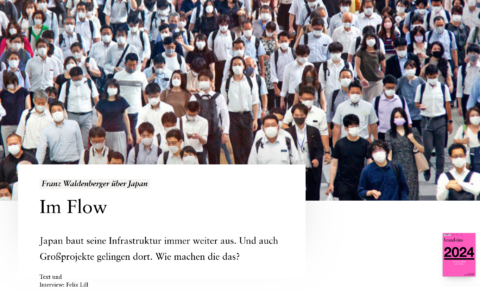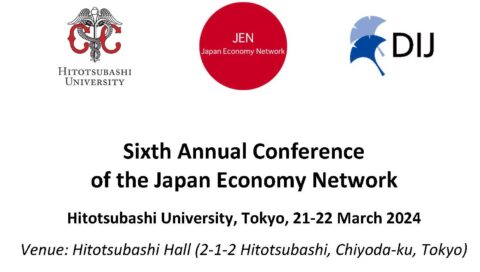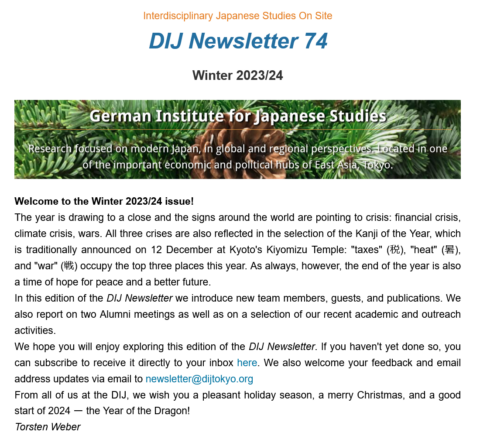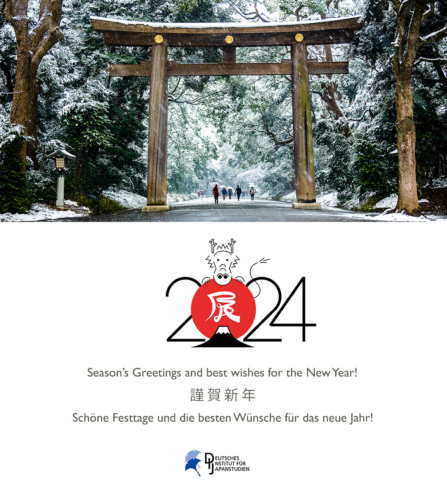イベント&アクティビティ
Hybrid Study Group on Political Economy of Green Industrial Policies in East Asia
 Green industrial policies are at the center of a distinct sustainability transformation process in East Asia, most notably in China, Japan, and South Korea. These East Asian late-capitalist economies differ in many ways but also share strong commonalities that distinguish them from Western capitalist types. The three countries are now taking a leading role in developing green technologies, industries, and exports. In fact, they have been able to occupy crucial parts of the global value chain in green industries and the international political economy of sustainability. This presentation investigates why the three East Asian countries succeeded in green technology leadership but lack behind in achieving other environmental goals. What are the distinct characteristics that distinguish them from Western market economies and what are the lessons that can be drawn for countries in the Global North and the Global South alike? Details and registration here
Green industrial policies are at the center of a distinct sustainability transformation process in East Asia, most notably in China, Japan, and South Korea. These East Asian late-capitalist economies differ in many ways but also share strong commonalities that distinguish them from Western capitalist types. The three countries are now taking a leading role in developing green technologies, industries, and exports. In fact, they have been able to occupy crucial parts of the global value chain in green industries and the international political economy of sustainability. This presentation investigates why the three East Asian countries succeeded in green technology leadership but lack behind in achieving other environmental goals. What are the distinct characteristics that distinguish them from Western market economies and what are the lessons that can be drawn for countries in the Global North and the Global South alike? Details and registration here
Film screening and discussion of patterns of moving to rural Japan

Japan’s regions have been challenged by demographic decline and an aging population for some decades. Despite or even because of these challenges, a small number of people from urban centres of the country decide to move to rural areas. This DIJ Forum (onsite only) combines two different perspectives on migration patterns from urban to rural Japan. Filmmaker Sonja Blaschke introduces her film “Reisfeld statt Tokio” (in German, with English subtitles; 30min), highlighting the story of a young urban woman and her new lifestyle in a small village in the mountains of rural Japan. Tomoo Matsuda then introduces cases of urban professionals who decide to live temporarily or permanently in Japan’s countryside. Challenging the traditional pattern of migration to the nation’s capital, he illustrates the concept of “gyaku-sankin kōtai”, exploring the merits of moving to rural areas. Details and registration here
Sonja Blaschke, freelance journalist
Tomoo Matsuda, Mitsubishi Research Institute
Franz Waldenberger im Gespräch über japanische Infrastrukturpolitik mit brand eins Magazin

Stuttgart 21, Flughafen Berlin, veraltete Infrastruktur, Verspätungen: Großbauprojekte laufen in Deutschland selten nach Plan. Was macht Japan anders und was kann Deutschland von Japan lernen? DIJ-Direktor Franz Waldenberger erklärt im Interview und Artikel “Im Flow” (brand eins, 1/2024), wie Investitionen in die Infrastruktur und in die Verkehrsplanung Japan einen Mobilitätsvorsprung gegenüber Deutschland verschafft hätten. So könne bei der Nettoreisezeit die Bahn in Japan bis 800 Kilometer mit dem Flugzeug mithalten, wogegen dies in Deutschland nur bis 400 Kilometer gelte. Insgesamt sei der öffentliche Transport in Japan deutlicher besser als in Deutschland, weil für ihn mehr Ressourcen genutzt würden und der Verkehr besser geplant sei. Waldenberger verweist auch auf die relativ zeit- und kosteneffiziente Umsetzung von Großbauprojekten in Japan, die im Alltag nur zu geringen Störungen führe. “Es ist Wahnsinn, welche Großbauprojekte mitten in Tokio stattfinden”, sagt er. Auch wenn neue Stadtviertel oder Verkehrsnetze gebaut würden, funktioniere “drum herum alles ganz normal weiter”.
UPDATED European-Japanese dialogue on ‘How to deal with China’
 Please note that this event has changed to an online only format. Given China’s indisputable economic and geopolitical importance, China cannot be ignored, passed or de-coupled. It is at the same time a partner, a competitor as well as an ideological and potential military opponent in the evolving multipolar world order. When dealing with China, how should we balance these different relational aspects? How can we maintain a constructive exchange without jeopardizing our own interests? Through a dialogue between European and Japanese China experts, the conference How to deal with China will address these questions from different perspectives. Speakers include Hans van Ess (LMU Munich), Mats Lennart Harborn (Traton China Group), Shigeto Sonoda (University of Tokyo), Osamu Mogi (Kikkoman Corporation), and Junichiro Ikeda (Mitsui O.S.K. Lines). The conference is co-organised by the University of Tokyo’s Global Asian Studies, the Keizai Doyukai, and the DIJ. Details and registration here
Please note that this event has changed to an online only format. Given China’s indisputable economic and geopolitical importance, China cannot be ignored, passed or de-coupled. It is at the same time a partner, a competitor as well as an ideological and potential military opponent in the evolving multipolar world order. When dealing with China, how should we balance these different relational aspects? How can we maintain a constructive exchange without jeopardizing our own interests? Through a dialogue between European and Japanese China experts, the conference How to deal with China will address these questions from different perspectives. Speakers include Hans van Ess (LMU Munich), Mats Lennart Harborn (Traton China Group), Shigeto Sonoda (University of Tokyo), Osamu Mogi (Kikkoman Corporation), and Junichiro Ikeda (Mitsui O.S.K. Lines). The conference is co-organised by the University of Tokyo’s Global Asian Studies, the Keizai Doyukai, and the DIJ. Details and registration here
Hybrid Study Group on education at Japan’s National Defense Academy

After the physical and moral devastation brought by the defeat in the Asia-Pacific War, Japanese administrations in the Cold War era charted a course of gradual rearmament against the backdrop of substantial anti-militarist sentiments among the wider society. This tension placed members of the newly rebranded Self-Defense Forces (SDF) in an uneasy position. This research project examines the institutional socialisation of the SDF’s leadership through a one-year ethnography of Japan’s National Defense Academy (NDA), where the bulk of the future senior officers of the SDF’s three branches are educated. Through this anthropological inquiry, this presentation seeks to answer how history, tradition, and identity of the Japanese SDF are negotiated at the NDA. Details and registration here
DIJ co-organizes Annual Conference of the Japan Economy Network
 Together with Hitotsubashi University, the DIJ co-organizes this year’s Sixth Annual Conference of the Japan Economy Network (JEN) on March 21-22. The conference features thirty-six speakers in ten sessions, including a dinner keynote speech by Nobuko Nagase (Ochanomizu University), chaired by DIJ economist Markus Heckel. DIJ advisory board member David Chiavacci (University of Zurich) will give a presentation on “Transnationalism and foreign workers in Japan: Between state policies and market forces”. The full programme is available here (PDF).
Together with Hitotsubashi University, the DIJ co-organizes this year’s Sixth Annual Conference of the Japan Economy Network (JEN) on March 21-22. The conference features thirty-six speakers in ten sessions, including a dinner keynote speech by Nobuko Nagase (Ochanomizu University), chaired by DIJ economist Markus Heckel. DIJ advisory board member David Chiavacci (University of Zurich) will give a presentation on “Transnationalism and foreign workers in Japan: Between state policies and market forces”. The full programme is available here (PDF).
DIJ Newsletter Winter 2023/24
 In the winter issue of our DIJ Newsletter we introduce new team members, guests, and publications. We also report on two Alumni meetings as well as on a selection of our recent academic and outreach activities. We hope you will enjoy exploring this new edition of the DIJ Newsletter. If you haven’t done so yet, you can subscribe to receive our Newsletters directly to your inbox. The full issues and subscription form are available here.
In the winter issue of our DIJ Newsletter we introduce new team members, guests, and publications. We also report on two Alumni meetings as well as on a selection of our recent academic and outreach activities. We hope you will enjoy exploring this new edition of the DIJ Newsletter. If you haven’t done so yet, you can subscribe to receive our Newsletters directly to your inbox. The full issues and subscription form are available here.
Season’s Greetings and best wishes for the New Year

Das Deutsche Institut für Japanstudien wünscht erholsame und frohe Festtage und einen guten Start in ein erfolgreiches Jahr des Drachens!
The German Institute for Japanese Studies wishes you a happy holiday season and a successful Year of the Dragon!
ドイツ日本研究所一同、皆様のご多幸と来るべき新年が成功の年になることを祈念いたします。





 Open Access
Open Access
